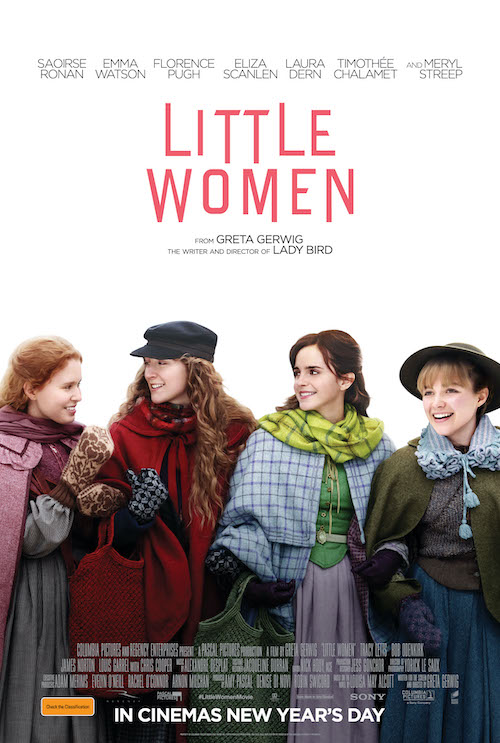
Some books are classics, but in the modern era they serve better as blue prints for adaptations. Louisa May Alcott's 1869 novel Little Women is a landmark novel, but to the eyes of today it is fragmented, moralistic, and bigoted against the Irish. In her own version of Little Women, writer/director Greta Gerwig (Lady Bird) takes most of the greatest elements of the novel — and at least part of one of the dumbest — and fashions them into something vibrant and new.
Little Women follows the fortunes of the March sisters across two timelines.
In 1868, Jo (Saorsie Ronan, Mary Queen of Scots) is trying to sell her writing in New York City; Meg (Emma Watson, The Circle) is struggling to raise her two children in poverty; Beth (Eliza Scanlen, TV's Sharp Objects) is ailing; and sister Amy (Florence Pugh, Midsommar) is on an art tour of Europe with Aunt March (Meryl Streep, The Laundromat).
In 1861, the March sisters live together in Concord, Massachusetts, waiting for their father (Bob Odenkirk, Long Shot) to return from the Civil War, putting on their amateur theatricals, and visiting with neighbour Laurie (Timothée Chalamét, The King).
Apart from access to an ensemble of actors and movie cameras, Gerwig has one major advantage over Alcott: she knows the whole story from the start, whereas Alcott published Little Women in two volumes, a year apart, and upset the fans of the day in multiple ways that would be eerily familiar to anyone au fait with the machinations of modern fandom. The split timeline is Little Women's greatest triumph, with Gerwig able to arrange the scenes in the most aesthetically and narratively pleasing parallel fashion. It is a genius piece of construction, and it comes together in an intensely gratifying way when circumstances are able to convalesce. One of the more arbitrary elements of the story comes alive and is legitimately moving rather than something that merely happens.
Even on Allcot's pages, the Little Women were not treated as equal: Jo and Amy have the heaviest lifting, and Ronan and Pugh do it for them. Pugh's job is tough as, unlike many earlier versions, Amy is not double cast, and in one scene she is ostensibly 13 and sharing a classroom with actual child actors. Amy is the most difficult Little Woman to love, as she commits almost unspeakably brattish acts against Jo before she is allowed to mature; Pugh pays back her ungainly youth by giving one of the speeches that anchors and centres the film: the romantic becomes the pragmatic becomes the visionary.
Ronan embodies the contradictions that define Jo March, and she carries them off well even as she reflects the limitations of the source material; as Marmee, Laura Dern (Marriage Story) is particularly good at understanding and encouraging her character's daughter, emphasising her own range as an actress. The story has always judged Jo for her headstrong nature: if Jo enjoys writing genre fiction, why must she force herself to write moralistic edifiying literature to impress a German man (Lois Garrel, An Officer and a Spy) who, in this incarnation, Gerwig has allowed herself the licence to twist? The men of Little Women are constantly negging the sisters and giving them instructions that are more in the interest of the men than the sisters themselves. Realistically they should start a commune with teacher John Brooke (James Norton, Mr. Jones), Father March, and Mr. Laurence (Chris Cooper, Cars 3) the only men allowed to visit, never to stay.
Despite the debatable weaknesses of Little Women, Gerwig has made a movie that excels on every front. The remix of the story order, the sly winks at Alcott's forced happily ever afters, and the masterful ensemble casting, create an atmosphere that suggests a woman in total control of her art. Little Women exists on a heightened plane of existence where the viewer potentially feels constantly on the verge of tears, and when the dam breaks, it is both devastating and cathartic.
Little Women may be 150 years old at this point, but sisters will always exist, hate, love, and support one another. The story does not quite have the universality that it pretends — most poor people don't have live in maidservants, or rich aunts who take them to Europe — but there's something for everyone here, and Gerwig has put together another handsome and heartfelt film, with only the slightest hint of cynicism.
Little Women opened in Australian cinemas on January 1, 2020.
Directed by: Greta Gerwig.
Starring: Saoirse Ronan, Emma Watson. Florence Pugh, Eliza Pugh, Eliza Scanlon, Laura Dern, Timothée Chalamét, Meryl Streep, Tracy Letts, Bob Odenkirk and Chris Cooper.

